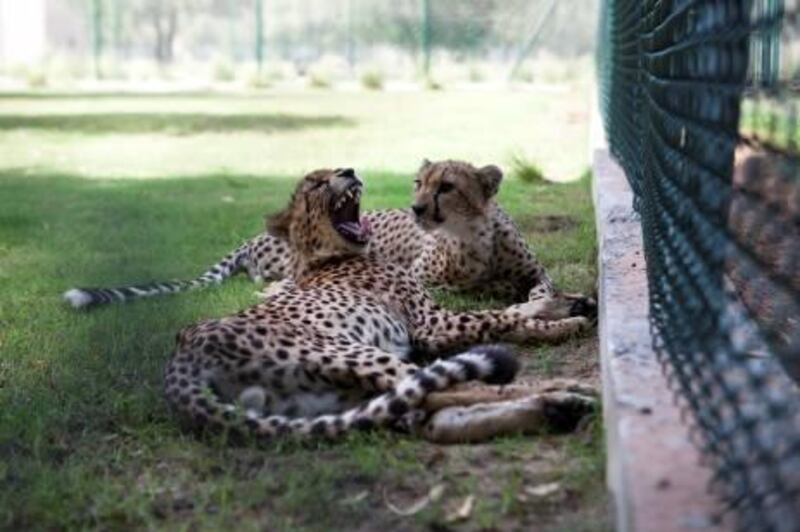DUBAI // An animal-rights campaigner has called on the Government to create a protection agency, days after a cat was shot 12 times with an air gun.
An authority would ensure better enforcement of animal-welfare laws and fill gaps in legislation, said Ronel Barcellos, the manager of the Abu Dhabi Wildlife Centre.
MORE ON ANIMAL WELFARE
'Brutal torture' of cat shot 12 times A cat was shot 12 times with a pellet gun in its neck, jaw, pelvis, ankle and lungs, and is undergoing multiple surgeries. Read article
Man arrested with exotic baby animals in suitcase Emirati man arrested for animal smuggling after baby leopards, a monkey, gibbon and a bear were found in two suitcases. Read article
COMMENT: A brutal cat shooting that demands a local response This week's report of a tortured cat brings back memories of childhood efforts to help animals, efforts that still seem worthwhile today. Read article
"We need a separate policing entity in the UAE that can confiscate animals," Mrs Barcellos said. "The law is in place but there is nobody who is really enforcing it."
Her comments followed the shooting of Mickey the cat on October 1 at Al Barsha 2 residential complex in Dubai.
The four-year-old cat was sent home from a veterinary clinic on Friday and is recovering from serious wounds to the skull, lungs, pelvis and legs. Its owner, Alison Caldwell, is preparing to take the case to police.
Violators of the emirate's animal-welfare laws can face fines of up to Dh20,000.
"I hope they take this seriously," said Mrs Caldwell, who is planning to show police pictures and X-rays of the animal's injuries, and a medical report from the Veterinary Hospital in Al Quoz.
Dr Max Spicer, the managing partner at the Veterinary Hospital, said Mickey was "responding very well to the surgery and medications".
Dr Spicer has called it the worst case of animal cruelty he had seen in his 15 years as a vet.
"Only one pellet remains, which is lodged in the muscle of the diaphragm near the aorta, but it is not life threatening and we do not need to rush into surgery for that," he said.
The cat has been put on antibiotics for a month to ensure the wounds do not attract infection.
"He is off his major pain relief and he is eating OK," said Mrs Caldwell. "On Wednesday he was purring for the first time. But I am not going to stop [seeking justice] just because he is feeling better."
A Dubai Police official said animal abuse cases were penalised under federal law.
Col Jamal Al Jallaf, the deputy director general of Criminal Investigations for Management Affairs at Dubai Police, said police had previously referred such cases to the public prosecution.
But Col Al Jallaf was not able to disclose the number of cases.
Dubai Municipality also can investigate animal abuse, but only if investigators are contacted by a third party.
"We do not have the authority to go inside somebody's house to check, only in cases where we have complaints," said Adil Al Badri, the head of the municipality's animal-welfare unit.
People who witnessed cruel treatment of animals can call the municipality on 800 900, he said.
So far this year, the section has dealt with eight cases involving abandonment of pets and keeping dogs outside homes without shade. There were several cases of people owning small primates, which is illegal.
In all cases, the municipality could only confiscate animals and was not able to issue fines or prosecute offenders, said Mr Al Badri.
That responsibility fell with the Ministry of Environment and Water, he said. The ministry was not available to comment.
Mrs Barcellos said police took animal-abuse cases seriously, but such cases were on top of their regular duties, and they were not trained to deal with them.
An animal police force would not only know how to enforce the law, but also how to train and rehabilitate animals, she said.
The Abu Dhabi Wildlife Centre looks after rare exotic animals that had been illegally kept as pets.
The facility specialises in large cats - cheetahs, lions, tigers and jaguars - but also caters for smaller pets such as domestic cats and dogs.
In all cases, the animals were subjected to some form of abuse or cruelty, Mrs Barcellos said.
"We once rescued a few African lions that were kept tied with chains by their owners," she said.
The animals had been declawed and had had their canine teeth removed, leaving nerves painfully exposed, she said.
"It cost us an arm and a leg to repair their teeth but we could not leave the animals in pain," Mrs Barcellos said. "They are all doing fine now."
She said people should never consider owning a wild animal, as removing it from its natural habitat meant it was unable to learn survival skills from its parents and was denied the chance to breed.
"Placing a wild animal into a villa is like you are sentencing it to death," she said.
Such animals also develop behavioural problems. "These animals do not know their identities," Mrs Barcellos said. "When young, they are friendly to people but they grow up to become aggressive, frustrated animals."
Mrs Barcellos said there must also be a more consistent effort to educate the public about animal rights. She said people should be taught that owning an exotic pet was illegal and bad for the environment, as it could deplete wild populations.
"We had two cheetahs donated to us after the article about the cheetah running loose in Abu Dhabi [in May]," she said.
"The owners saw articles in the media and realised that what they were doing was wrong."
Letters about Mickey, page a15






